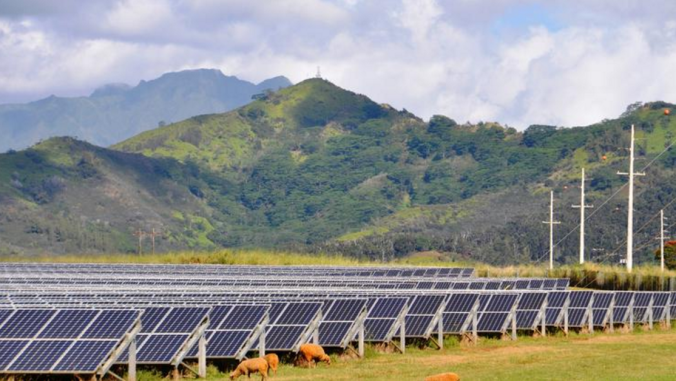Will the GenZe scooter disrupt your commute?
Meet the $2,999, American-made electric scooter with a snap-out battery.

American cities are rethinking transportation, as urbanites rethink cities and how to get around in them.
Cars are not so appealing anymore; they are isolating, expensive, a bother to park, and they pollute. Meanwhile, cities have to be redesigned to make room for more people while reducing smog and CO2.
Cities from Portland to Boston, Oakland to New Orleans are encouraging the use of public transportation, bikes and shared vehicles while increasing parking fees.
Many have "smart city" blueprints on the drafting board where four-wheeled, gasoline powered cars are out of the picture, replaced by a system of light rail complemented by shared electric vehicles (EVs) available on-demand for commuters.
It's that last mile between train and office that cities want to solve, along with millennials' inclination to ditch cars in favor of bikes or shared rides, as well as a general desire to reduce carbon footprints that is creating a new market.
Within this changing urban transportation marketplace GenZe, a U.S. subsidiary of Indian transportation conglomerate Mahindra Group, developed what it sees as the urban commuter vehicle for U.S. cities of the future — the near future, that is.
GenZe — named for "next generation" and "zero emissions" — has created an electric scooter that has certain amenities for urban commuters. It’s a one-person lightweight motorcycle with storage for a briefcase or groceries, and equipped with smart-vehicle logistics apps for drivers to find out how to get places, which routes have traffic, how their battery is doing and so on.
The GenZe 2.0 is in production, and GenZe plans to ship its first scooters in October.
GenZe, based in Fremont, California, on the edges of Silicon Valley, touts its scooter as a Valley-engineered and Michigan-made EV that answers commute headaches and the need — and desire — for zero emissions vehicles. It already sells an electric powered bicycle — the GenZe e-bike — but that, it says, was just a precursor.
“We went out and traveled the country to various cities, urban centers. We talked to people asking how do you get from point A to B, how do get to work or school? And we asked what are your pain points in those commutes,” said Yesim Erez, GenZe's head of marketing, describing the road trip led by Terry Duncan, the product’s designer, three years ago.
“We learned so much from that exercise. We learned that people don’t want to be stuck in traffic, that sometimes it is easier for people to bicycle or train than take car.
“We also learned that people sometimes are inconvenienced by those choices. The bus or train doesn’t go everywhere. Your office might be a mile away from the train stop. And not everybody is in shape to take a bicycle or they don’t want to arrive at a meeting sweaty."
Moreover, she said, "They may want to take a briefcase or gym bag to work or stop on the way home for groceries,” which are not easily done on a traditional bicycle or even by train.
Thus they came up with the GenZe 2.0, a two-wheeled EV that looks like a cross between a scooter and a motorcycle.

They're not for the highway — their top speed is 30 miles per hour, so the GenZe 2.0 differs from other new EV motorcycles on the market such as the Empulse TT made by Brammo or Zero Motorcycles' Zero SF 12.5, which can go about 95 miles per hour. But those more brawny motorcycles also sell for $19,999 and $14,000.
The GenZe is only $2,999.
Also, GenZe's battery's range is only about 30 to 40 miles miles compared with 110 miles of the big EV motorcyles for the highway.
But the kicker is that GenZe 2.0's battery snaps out and can be carried into an office or coffee shop for charging. Thus there's no need to park the GenZe 2.0 at a charging station. The Lithium-Ion battery, contained in a battery pack, can be plugged into standard electrical outlets.
And it doesn’t take gasoline, of course.
What's all this mean?
Like the Nissan Leaf, the Tesla sedan and the Proterra EV bus, the GenZe 2.0 motorcycle is a product filling a newly emerging space of EV transportation that begins to tackle the pollution problems of the urban core and the greenhouse gas problems of the globe. Like the Gogoro EV scooter in Taiwan, it may have to nudge this market along.
Consultant and mobilty designer Dan Sturges told GreenBiz this summer that the four-wheeled, gasoline powered car for solo driving commuters driven by a solo commuter is a scenario of the past that soon will disappear.
"Nearly 50 percent of our trips in urban areas are less than three miles, and 28 percent are one mile or less. Our cars are over-engineered for nearly every trip we take in them. It’s overkill. It’s like killing a roach with a shotgun. We could not do anything about this before the auto tech revolution, but now we can," he said in an interview with GreenBiz.
In smart cities discussions spawned by the 100 Resilient Cities movement and others, cities are talking about multi-modality transportation, about building infrastructurs and kiosks and systems so that city workers or residents can take trains for parts of their commutes and then hop on a shared vehicle motor scooter or bike or the rest of their trip, the last half mile to the office or meeting or home. They envision zero emissions trains and vehicles, bicycles and walkways.
GenZe aims to tap into that desire and is in discussion with several cities, including Oakland, and state agencies about pairing up to create city kiosks where potential drivers could rent a GenZe to get to a meeting, say, or find one at the end of a train commute.
Learn more about EVs and smart cities and see a GenZe 2.0 EV scooter at VERGE 2015 Oct. 26-29 in San Jose, California.





